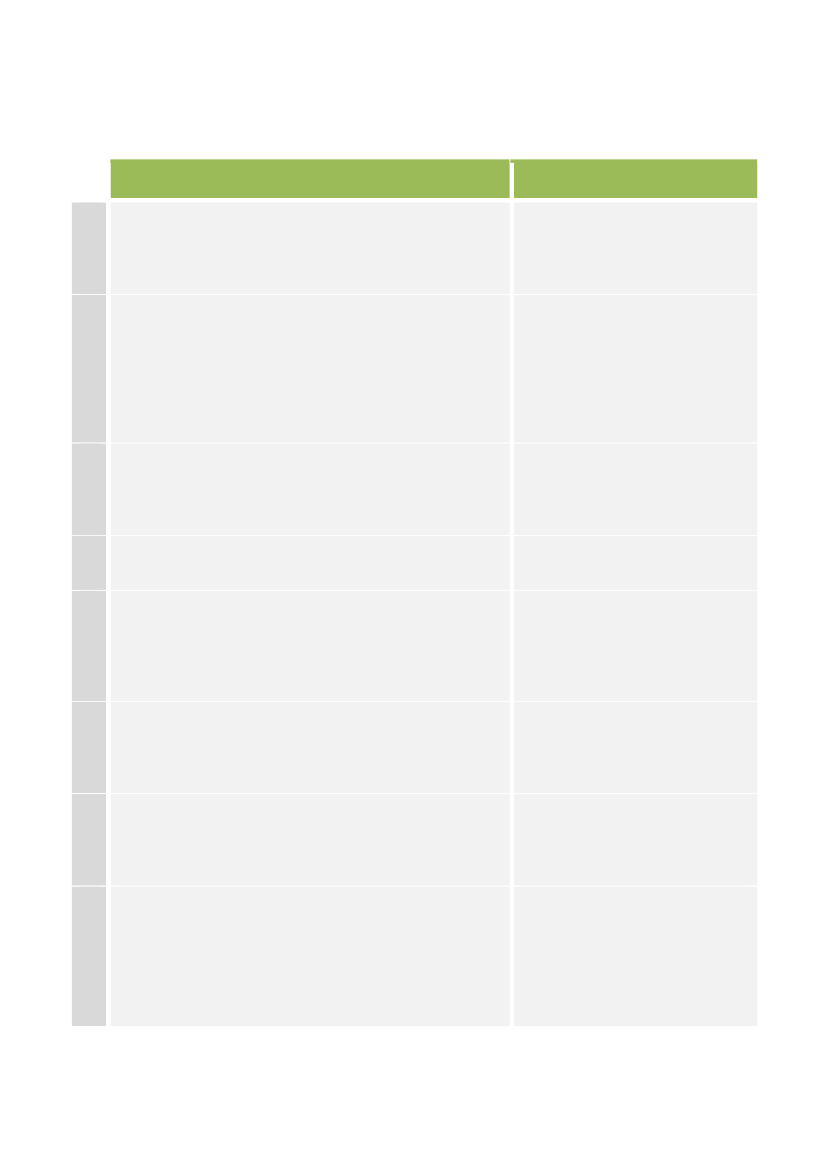Udenrigsudvalget 2013-14, Klima-, Energi- og Bygningsudvalget 2013-14
URU Alm.del Bilag 13, KEB Alm.del Bilag 31
Offentligt
Klimapuljen – appraisal anbefalinger og opfølgningRecommendation GGGI1.Follow-up
When the GGGI strategy and work plan are developed and approvedAgree.by the GGGI Board, an inception review should be undertaken inKorea, in order to undertake a full assessment of the GGGI programand the organizational aspects that have not presently been finalized.It is recommended that Denmark emphasize the aid effectivenessagenda within the field of green growth/economy country programs andprocesses, incl. eliminate overlaps and enhance complementaritiesbetween GGGI and others. It also recommended that the inclusion ofother stakeholders in the country programs is encouraged and that thebenefit of conducting analysis of drivers of change and political economyis highlighted.It is recommended that Denmark promotes the view that GGGIshould consider the need for a stronger country level presence throughoutthe period of the country programs, and not least in the phase offinalization and quality assurance of the national green growth plans.Agree. The wider inclusion ofstakeholders in the country projectswill be incorporated into theGGGI strategy to be presented tothe Board.
2.
3.
Increased country level presencewill be incorporated into thestrategy to be presented to theGGGI Board.
4.5.
It is recommended that Denmark as a board member and otherwiseAgree.actively promote further GGGI engagement in African countries.It is recommended that cross-cutting issues are mainstreamed in theA Danish TAS mission in AprilGGGI strategy and that Denmark pays close attention to the growth,2011 will work with GGGI topoverty reduction and human rights aspects of the GGGI work.mainstream cross-cutting issues,incl. poverty focus, into the GGGIstrategy and procedures.It is recommended that Denmark promotes the establishment of aGGGI is currently developing theGGGI the advisory council to be used actively for strategic guidance inguidelines for the advisory council.order for GGGI to profit from existing experience in this crucial start-up phase.It is recommended that Denmark works towards lowering theAgree.ambitions of GGGI in terms of number of partner countries in thefirst years, and consider selecting cluster of countries where economies ofscale and cross-fertilization of experience can be obtained.The Danish Embassy in Seoul should assess the financial andAgree.administrative procedures of GGGI before disbursing any funds.Subsequently, a first installment of an inception period of six – eightmonths can be disbursed based on an approved budget and work-planfor that period. The rest of the funding should depend on the outcome ofthe inception review where the overall strategy, work plan and budgetwill be assessed. The staff policy of GGGI could be assessed as part of
6.
7.
8.
Recommendation GGGIan inception review.9.
Follow-up
It is recommended that Denmark appoint a GGGI Board member asAgree. The Danish Board Memberquickly as possible.candidacy should be presented tothe GGGI Board for approval atthe Board meeting on 30. March2011. This will enable the DanishBoard member to participate in thenext Board meeting on 19 June.It is recommended to promote the establishment of quantified and time-bound indicators as part of the GGGI strategy and to request submitsix-monthly reporting to the Board from the country programs andother activity areas of GGGI.It is recommended that Denmark requests an annual update throughthe Board on developments with regard to the assumptions and risks,and that additional or adjusted assumptions and risks are added.A Danish TAS mission in April2011 will work with GGGI todevelop quantified and time-boundindicators,monitoringandreporting procedures.A Danish TAS mission in April2011 will work with GGGI onassumptions and risks.
10.
11.
Recommendations GCPF1.It is recommended that the proposed program be presented to the Boardof Danida with the minor adjustments that are proposed in thisappraisal report.It is recommended that the annual shareholders meetings are used toactively monitor developments and performance of the Fund.
Follow-up
2.
Recommendations SIDS1.(R1)ensure full consultation with and active involvement by thegovernments, energy sector agencies and other stakeholders in the SIDSin the continued development of the “docking mechanism” and“support partnership.”(R2) in finalizing the program document, opportunities for tacklingpoverty and confronting gender inequalities in energy sector
Follow-up
2.
transformation be made more explicit.3.(R3) A inception review of the program be carried out by the TechnicalAdvisory Service (Danida) before the end of 2011, focusing on theorganizational set up and on the process of allocating funds to theSIDS for energy sector (RET and EE) projects.
Recommendation Maldives1.
Follow-up
Complete the design of the program as soon as possible, with a conciseDue to local elections and politicalspecification of objectives, strategies, results and outcomes as well as costuncertainty the detailedestimates.formulation process has beendelayedContinue the program design with a view to focusing on priorities forFollowing local elections the newresilient development, based on thorough consultation with stakeholdersauthorities are getting ready toon the selected atoll or atolls.engageFinalise the program management arrangements such that theMaldives government together with local institutions on the selectedatoll or atolls play an active role in planning and oversight.An inception review of the program to be carried out by Danida, whenthe final program design has been completed, in accordance with termsof reference to be agreed with the UNDP and the Government of theMaldives.A local government reform processhas produced new structures to beincorporated in project designAn inception phase to be followedby a review is scheduled for
2.
3.
4.
Recommendations Indonesia1.2.3.4.Clarify the management set-upPhase implementation to allow for proper preparation; TAS leadInception Review after 6 monthsSpecify the link to Indonesia’s overall REDD ProgramBefore the inception review the following outcome should be achieved
Follow-upThe management set-up is basicallyin place but needs to be betterdescribedAn inception phase of 6 monthsfollowed by a review will meet theneed for phasingThe links will be very close as theEmbassy is involved in the overallREDD programWill be included in the TOR for
A study of the legal feasibility of reclaiming the land forunproductive investors;Capacity assessments , including of the financialmanagement capacity, of the Harapan Management Unitand the NGO Burung; The amounts assigned to bothentities seem very high;Documentation on meetings held with the concernedcommunities in the area; with the Indigenous Peoples toguarantee free, prior and informed consent, and withrepresentatives from the famer communities to get acceptanceon the proposed strategy;Link to national strategies and to the Task Force forREDD + specified;A revised risk assessment;A revised Monitoring Framework;The need for Indonesian and international technicalassistance defined, including an assessment of the Terms ofReference for International Technical Assistance ( lTA ),and an analysis of advantages/disadvantages of residentadvisors to short term consultants. The capacity assessmentswill indicate whether the pool for international and nationalTA should be managed according to Indonesian or Danidaprocurement procedures;Clarification of Steering Committee functions. The linkbetween the pilot project in Harapan and the overallnational programme should be the Steering Committee,ideally an already existing Steering Committee. The projectdocument should clearly describe Steering Committeefunctions, in particular the monitoring responsibility (boththe Monitoring, Reporting and Verification System and thesocial impact monitoring) and documentation of results;Budget should be output-based and the monitoring ofexpenditures relate to the output- based budget.
the inception review.The procurement procedures to beapplied will be those of theimplementing partner – not of theGovernment
Recommendation Kenya1.Restructure the programme to consist of three components, each withits own immediate objective and related concrete outputs.
Follow-upThe 3 ‘outputs’ will be changed to‘components’ and immediate
objectives aligned with theobjectives of BSPS and NRPM willbe introduced.2.Not to relax on environmental assessment of theconsidered projects, even if they belong safely to the cleanenergy category, and to ensure that the InvestmentCommittee has access to expertise in all the project fieldsconsideredAs soon as possible carry out a thorough assessment or study oflikely absorption rates for the additional funding through the threecomponents.Integrate as much as possible the FSCCP components1/REACT and 2/KAM into the BSPS II sectorprogramme and the FSCCP component 3/CDTF intothe NRMP sector programme, also with respect tostandard annual reviews.Clarify the relation between the FSCCP and theMinistry of Environment and Mineral Resources(MEMR) at programme management and coordinationlevel.Carry out an inception review of FSCCP components1/REACT and 2/KAM as part of the regular annualreview of BSPS II, scheduled next time for October 2011and to field an inception review of FSCCP during thesecond semester of 2011 preferably integrated in anannual review of NRMP, if such review will take place.Thoroughly revise the logical framework for the programme with aview at the same time to facilitate monitoring at output and outcomelevel.GOK standards doestakethisintoconsideration and will befollowed–implementation will bemonitoredWill be assessed by the inceptionphase review. The ProDocprovides for possible budgetadjustments by then.The ProDoc does payadequate attention toalignment
3.
4.
5.
It is not foreseen thatMEMR and OPM(Office of PrimeMinister) will beimplementing partnersThe inception reviewphase will clarify thedivision of work. A briefaddendum to the NRMPwill be consideredThe Logical Framework will beupdated during the InceptionPhase
6.
7.





